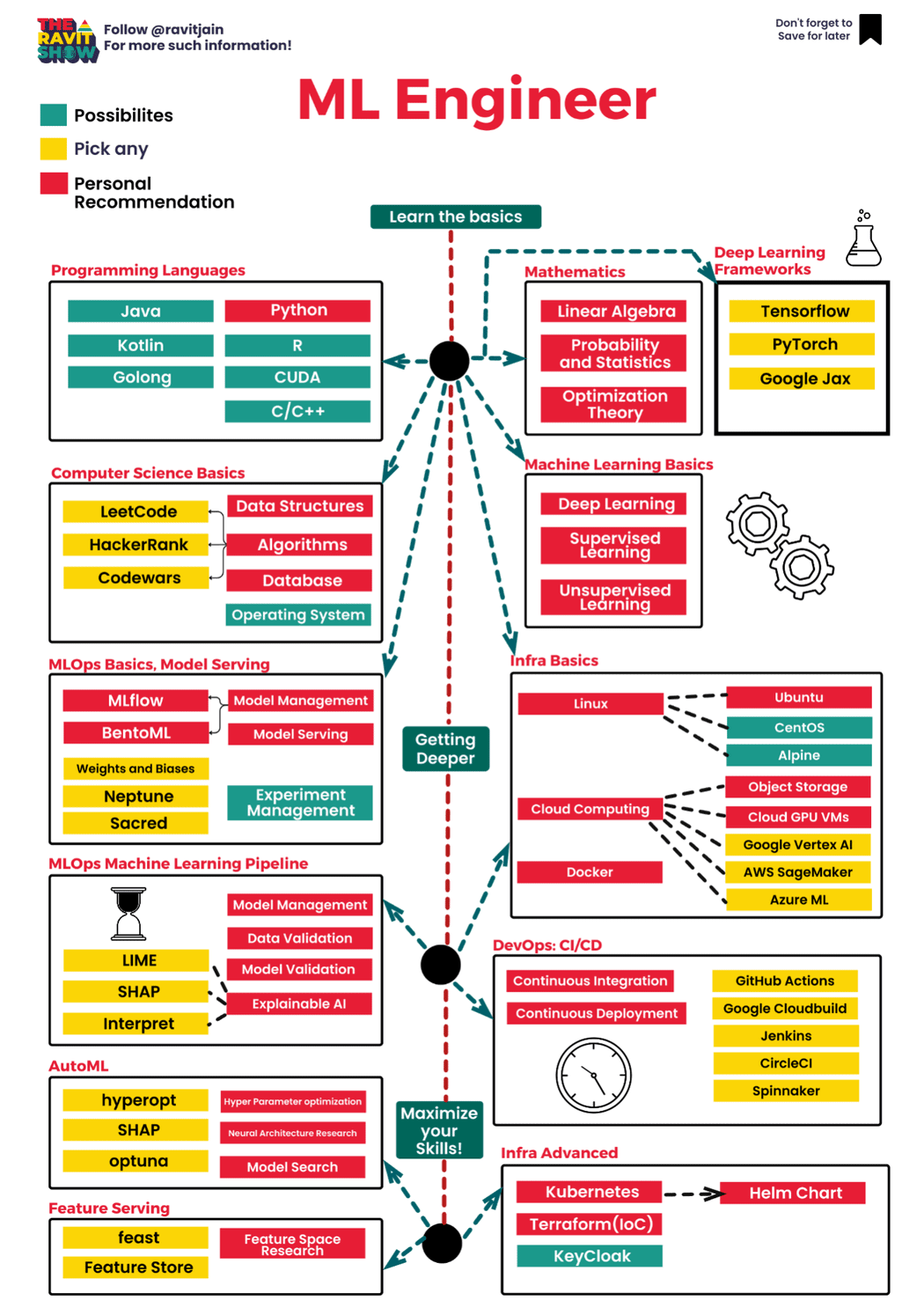
Becoming a Machine Learning (ML) Engineer is an exciting journey that involves gaining expertise in machine learning algorithms, data science, programming, and software engineering. Here’s a step-by-step guide to help you become an ML Engineer:
- Prerequisites:
- Education: A strong foundation in mathematics, particularly linear algebra, calculus, probability, and statistics, is essential. Most ML Engineers hold at least a bachelor’s degree in computer science, mathematics, or a related field, but many also pursue graduate degrees (master’s or Ph.D.) for in-depth knowledge.
- Programming Skills: Proficiency in programming languages is crucial. Python is the most commonly used language in the field of machine learning. Learn Python and become comfortable with libraries such as NumPy, pandas, scikit-learn, TensorFlow, and PyTorch.
- Data Handling: Gain experience in data manipulation, cleaning, and preprocessing. Understanding how to work with structured and unstructured data is vital.
- Software Engineering: Develop strong software engineering skills, including version control (e.g., Git), debugging, and software architecture. ML Engineers often build and deploy machine learning models into production systems.
- Fundamental Machine Learning Concepts:
- Study the fundamental concepts of machine learning, including supervised learning, unsupervised learning, reinforcement learning, and semi-supervised learning.
- Understand common machine learning algorithms like linear regression, decision trees, random forests, k-means clustering, and neural networks.
- Explore model evaluation metrics and techniques for assessing model performance.
- Advanced Machine Learning Concepts:
- Dive deeper into advanced machine learning topics, including deep learning, natural language processing (NLP), computer vision, and reinforcement learning.
- Learn about neural network architectures, convolutional neural networks (CNNs), recurrent neural networks (RNNs), and generative adversarial networks (GANs).
- Hands-On Projects:
- Apply your knowledge by working on practical ML projects. Start with simple projects and gradually take on more complex challenges.
- Participate in online competitions like Kaggle to solve real-world problems and learn from the ML community.
- Data:
- Learn about data acquisition, data cleaning, and data transformation. Understand how to handle various data types, including structured, semi-structured, and unstructured data.
- Explore databases and data storage systems, as you may need to interact with databases to extract and manipulate data.
- Model Training and Evaluation:
- Master techniques for training machine learning models, including hyperparameter tuning and cross-validation.
- Understand how to evaluate models using appropriate metrics, considering factors like accuracy, precision, recall, F1-score, and ROC-AUC.
- Software Engineering Skills:
- Develop proficiency in writing clean and efficient code, as well as creating modular and scalable machine learning pipelines.
- Learn how to use version control systems like Git to collaborate on projects with others.
- Deployment and Productionization:
- Familiarize yourself with deploying machine learning models in real-world applications. This includes containerization (e.g., Docker) and deploying models on cloud platforms (e.g., AWS, Azure, or Google Cloud).
- Understand the importance of model monitoring and maintenance in production systems.
- Continual Learning:
- The field of machine learning is constantly evolving. Stay up-to-date with the latest research papers, conferences, and trends by reading research papers, following blogs, and participating in online forums and communities.
- Portfolio and Networking:
- Build a portfolio showcasing your machine learning projects. Share your work on platforms like GitHub and LinkedIn.
- Network with professionals in the field by attending conferences, meetups, and joining online communities like Stack Overflow, Reddit’s r/MachineLearning, and LinkedIn groups.
- Apply for Jobs:
- Start applying for ML Engineer positions. Your portfolio and hands-on experience will be valuable during interviews.
- Continuous Improvement:
- ML Engineers continually improve their skills and adapt to new technologies. Keep learning and refining your expertise.
